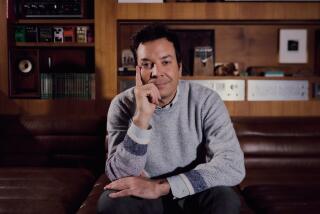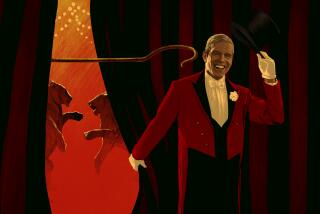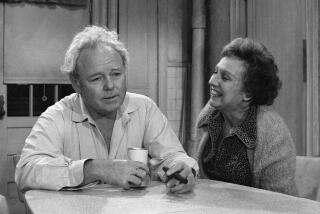Andy Rooney dies at 92; curmudgeonly commentator on ’60 Minutes’
- Share via
Andy Rooney, CBS News’ longtime resident curmudgeon whose whimsical and acerbic essays on “60 Minutes” turned the rumpled writer into an unlikely — and reluctant — TV celebrity, died Friday night, only weeks after retiring from the show. He was 92.
CBS announced the death of Rooney, who launched his long career during World War II as a correspondent for the Stars and Stripes military newspaper and continued to be a fixture on “60 Minutes” for 33 years.
FOR THE RECORD:
Andy Rooney: The obituary of TV commentator Andy Rooney in the Nov. 6 Section A said that Rooney was asked by a USA Today reporter in January about retiring and replied: “Retire? From what? Life?” Rooney made the comment in January 2010. —
He died at a New York City hospital of complications following minor surgery, according to CBS.
Photos: Andy Rooney | 1919 - 2011
For millions of Americans, Rooney was a welcome visitor into their homes on Sunday evenings, an old familiar face appearing for a few minutes at the tail end of one of the most highly rated programs in television history.
Viewers of the award-winning TV newsmagazine who saw him as a friend, neighbor or relative knew what to expect from the man who offered his opinions on a broad array of topics.
Wry. Curmudgeonly. Whimsical. An articulate Everyman. Unruffled yet quizzical. A crank. A complainer. The man of a thousand questions.
Those are just some of the words journalists have used to describe the man TV Guide called “America’s favorite grump.”
Seated behind his desk in his small, cluttered office at CBS in New York, Rooney spoke into the camera as though the viewer at home had just dropped in for a brief visit to see what was on his mind that week.
There was always something.
Designer jeans: “The facts of the advertising greatly exceed the fact of the average American posterior.”
Bank names: “Trust is a word banks like in their names. There are certain names they’d never use, ‘Bankorama,’ for instance.”
Baseball: “My own time is passing fast enough without some national game to help it along.”
But Rooney didn’t just spend his few minutes on seemingly trivial matters. In 2003, for example, he turned his attention to the French for failing to support the war in Iraq.
“You can’t beat the French when it comes to food, fashion, wine or perfume, but they lost their license to have an opinion on world affairs years ago,” he said. “The French lost World War II to the Germans in about 20 minutes.”
With Rooney, as his “60 Minutes” colleague Mike Wallace once said, “What you see is what you get.”
“I have never, never come across a man I admire more, respect more,” Wallace said during a discussion of journalism in World War II at the Smithsonian Institution in 2004.
“He’s loyal, he’s honorable. He’s got the guts to say what is on his mind. And, thank God, we’ve had the opportunity to let millions of Americans see him every Sunday night for the last couple of decades,” said Wallace.
An award-winning writer and producer of CBS News TV specials narrated by Harry Reasoner in the 1960s — “A Birdseye View of America” and “An Essay on Bridges,” among them — Rooney began appearing on camera himself as the writer-producer of a series of specials in the ‘70s.
“Mr. Rooney Goes to Dinner,” in which he explored the $11-billion restaurant business by visiting restaurants across America, was one. (If a restaurant menu has a tassel on it, Rooney told viewers, “add $2 to the bill.” And forget restaurants advertising home cooking. “If I want home cooking,” he said, “I’ll stay home.”)
The “rumpled pragmatist with a dry wit and a salty acerbic style” — as former Times television critic Cecil Smith described Rooney — first appeared on “60 Minutes” in 1978 as the summer replacement for “Point Counterpoint,” the brief, end-of-the-show segment featuring liberal Shana Alexander and conservative James J. Kilpatrick.
That fall, Rooney began alternating weeks with the two verbally sparring journalists, winning an Emmy for his essay titled “Who Owns What in America,” in which he visited Mrs. Smith’s Pies in Pottstown, Pa. and found that Mrs. Smith did not exist.
When the 1979-80 TV season started, Alexander and Kilpatrick were gone and “A Few Minutes with Andy Rooney” was well on its way to becoming a “60 Minutes” institution.
For his part, Rooney preferred being known simply as a “writer.” And he was not enamored with the celebrity that came with appearing on television each week.
“A writer should be sitting over in the corner watching the dance and not be out there dancing,” he told the Saturday Evening Post in 1984. “I’m not too keen about my recent well-known-ness; I don’t handle it very well. If somebody comes up to me on the street and says, ‘Hey, I like your stuff,’ well, I can’t hate that. But it never stops there. Pretty soon he wants to be my best friend. I tend to be rude to people like that.”
As for autograph seekers, Rooney refused to scrawl his name when a fan stopped him. At one point, whenever asked for an autograph, he would take the proffered piece of paper and write, “No.”
Rooney was the personification of the crusty newsroom veteran. He wore a suit and tie on camera, but you had the feeling that as soon as the camera lights were turned off he shed the coat, loosened the tie and rolled up his shirt sleeves.
With his bulldog face, bushy eyebrows and somewhat whiny delivery, the stocky Rooney was irresistible fodder for parody.
Comedian Joe Piscopo did a winning whining Rooney rendition on “Saturday Night Live” in the 1980s, employing a Rooney-esque refrain, “Did you ever wonder?” (For the record, Rooney told Newsday in 1989 that he examined all of his old “60 Minutes” copy and never used that line.)
Rooney’s weekly TV showcase led to a three-times-a-week nationally syndicated newspaper column that appeared in several hundred newspapers.
He also wrote 16 books, many of them best-selling collections of his work, including “A Few Minutes With Andy Rooney,” “Pieces of My Mind” and “Sincerely, Andy Rooney.”
Rooney was just as outspoken off-camera as on, which occasionally got him into hot water.
In 1990, CBS News suspended him without pay for three months in the wake of his remarks about blacks and gays attributed to him in the Advocate, a magazine that covers the gay community.
The Feb. 27, 1990, edition of the Advocate quoted Rooney as saying, “Blacks have watered down their genes because the less intelligent ones are the ones that have the most children.” It also contained a letter Rooney wrote that called the homosexual sex act “repugnant” and homosexuality “not normal.”
In an interview with the Los Angeles Times after his suspension, Rooney categorically denied making the statement attributed to him about blacks during his phone interview with the Advocate. But he did confirm that he wrote the letter to the magazine commenting on gays in response to criticisms of his views on homosexuality.
“I am guilty of what I said about gays, and I deeply regret having offended them,” he said. “But on the other charge, I am absolutely innocent. I am just infuriated by the notion that I am being called a racist. Anyone who knows me knows that is not true.”
In the end, CBS, faced with an overwhelmingly negative public response to his suspension, reinstated Rooney after only three weeks.
There were other Rooney-generated controversies over the ensuing years, including his remarks on a television sports show in 2002 that women sideline reporters “have no business down there [on the field] trying to make some comment about a football game.”
Off-camera controversies or not, Rooney was on “60 Minutes” so long that some critics believed he had overstayed his welcome.
In 1996, Associated Press critic Frazier Moore wrote an open letter to Rooney in which he said that “’60 Minutes’ would be better off without you.”
Calling Rooney a “chronic fuddy-duddy” whose chief contribution is “ending the show on a sour note,” Moore wrote that Rooney’s weekly segments are “the product of a brazenly closed mind that does a disservice to the rest of the show.”
Despite the criticism, Rooney remained with the program.
When asked about retiring in January, when he turned 91, Rooney, seated in his office at CBS News, told a USA Today reporter: “Retire? From what? Life?”
But retire from “60 Minutes” he finally did.
On Oct. 2, the 92-year-old Rooney made his last regular appearance on the show in which he was interviewed by correspondent Morley Safer, who called him “America’s favorite grouch-in-chief.”
Rooney’s farewell essay was his 1,097th piece for the program.
“This is a moment I’ve dreaded,” he told viewers. “I wish I could do this forever. I can’t, though. But I’m not retiring. Writers don’t retire. And I’ll always be a writer.”
The son of a traveling salesman father, Rooney was born Jan. 14, 1919, in Albany, N.Y. He attended the Albany Academy prep school and was a student at Colgate University in Hamilton, N.Y., when he was drafted into the Army in 1941.
He was assigned to the 17th Field Artillery Regiment, part of the 13th Field Artillery Brigade. After shipping out to England, he applied for a reporter’s job with the London edition of the Stars and Stripes.
Rooney, who chronicled his four years with the Stars and Stripes in his 1995 book “My War,” wrote more than 200 stories for the newspaper.
In the process, Sgt. Rooney flew with the 8th Air Force on the first American bombing raid over Germany and covered the invasion of France after landing on a Normandy beach four days after D-day in June 1944.
Rooney was earning his living freelancing magazine stories when a chance meeting with Arthur Godfrey in an elevator at CBS in New York City in 1949 changed his fortune. Over the next six years, he wrote for Godfrey’s daily radio show and his two television programs. Rooney also wrote for CBS News public affairs programs such as “The Twentieth Century.”
After teaming up with Reasoner in 1962 as a writer and producer, Rooney won his first Writers Guild of America Award for the Reasoner-narrated “The Great Love Affair,” a look at America’s obsession with automobiles.
Rooney won his first Emmy Award for his script for “Black History: Lost, Stolen or Strayed,” one of the specials narrated by Bill Cosby in the 1968 CBS News series “Of Black America.”
In 2003, he was awarded an Emmy for lifetime achievement.
Rooney’s wife of 62 years, Marguerite, whom he called Marge, was a longtime Connecticut high school math teacher. She died in 2004.
He is survived by their four children, Ellen; Brian, a former ABC News correspondent; Emily, who hosts a Boston public-affairs program on PBS; and Martha; five grandchildren; and two great-grandchildren.
Photos: Andy Rooney | 1919 - 2011
More to Read
Start your day right
Sign up for Essential California for the L.A. Times biggest news, features and recommendations in your inbox six days a week.
You may occasionally receive promotional content from the Los Angeles Times.







